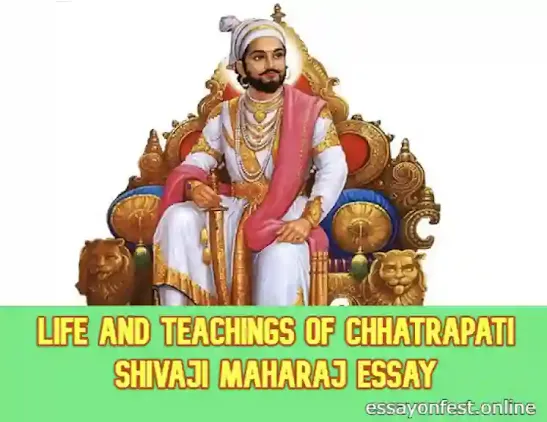Life And Teachings Of Chhatrapati Shivaji Maharaj Essay
Chhatrapati Shivaji Maharaj, a revered figure in Indian history, embodies the epitome of valor, leadership, and statesmanship. His life and teachings continue to inspire generations, shaping the ethos of courage, righteousness, and nationhood. Born on February 19, 1630, Shivaji emerged as a beacon of resistance against tyranny, championing the cause of justice and freedom.
Shivaji's early life was marked by the tumultuous political landscape of medieval India. Raised in the lap of the Maratha Empire, he imbibed the tales of valor and honor from his mother, Jijabai, and the teachings of the saint, Samarth Ramdas. These formative influences instilled in him a deep sense of duty towards his people and a vision of establishing a just and sovereign kingdom.
Central to Shivaji's teachings is the principle of Dharma, or righteous duty. He believed in upholding the moral order and protecting the weak against oppression. Shivaji's governance was characterized by his commitment to justice, religious tolerance, and respect for diverse cultures. He championed the cause of Swarajya, or self-rule, envisioning a society where every individual could thrive in dignity and freedom.
Shivaji's military prowess and strategic acumen are legendary. He transformed a small principality into a formidable force that challenged the mighty Mughal Empire. Through his guerilla warfare tactics and innovative military strategies, Shivaji inflicted significant setbacks on the Mughal forces, establishing the Maratha Confederacy as a dominant power in the Deccan.
Shivaji's fortification of key strongholds, such as Raigad and Pratapgad, symbolized his commitment to defending his people and preserving their way of life. His navy, comprising swift vessels known as 'ghaṭṭas,' secured the coastal territories and thwarted foreign invasions. Shivaji's military campaigns were not merely about conquest but about safeguarding the interests of his subjects and ensuring their safety and prosperity.
Beyond his military exploits, Shivaji's administrative reforms laid the foundation for effective governance. He established a decentralized administrative system that empowered local councils, known as 'Ashta Pradhan' or the Council of Eight Ministers, to govern autonomously in their respective regions. This system fostered accountability, transparency, and grassroots participation in decision-making, ensuring that the voice of the people was heard in matters of governance.
Shivaji's commitment to social justice and equality is evident in his policies towards marginalized communities. He abolished discriminatory practices and promoted social harmony among Hindus and Muslims. Shivaji's respect for women's rights and his emphasis on education as a means of empowerment reflect his progressive outlook and humanistic values.
Shivaji's legacy extends beyond the realm of politics and warfare; it encompasses a philosophy of leadership and nation-building. His emphasis on ethical governance, valor in the face of adversity, and devotion to the welfare of his subjects continues to resonate with leaders and citizens alike.
In contemporary India, Shivaji's teachings find relevance in the quest for inclusive development, social justice, and national integration. His vision of a strong, prosperous, and self-reliant nation inspires efforts towards nation-building and fostering unity in diversity.
The story of Chhatrapati Shivaji Maharaj serves as a timeless reminder of the power of resilience, determination, and moral courage. His life exemplifies the triumph of righteousness over tyranny, of hope over despair. In an age marked by uncertainty and upheaval, Shivaji's legacy offers a guiding light, urging us to uphold the values of truth, justice, and compassion.
In conclusion, the life and teachings of Chhatrapati Shivaji Maharaj epitomize the highest ideals of leadership and statesmanship. His unwavering commitment to Dharma, his military valor, and his vision of a just and prosperous society continue to inspire millions across the world. As we celebrate his legacy, let us pledge to honor his memory by striving for a world guided by the principles of justice, equality, and human dignity.
Also read: 21ನೇ ಶತಮಾನದ ಆತಂಕಗಳು ಮತ್ತು ಗಾಂಧೀಜಿಯವರ
Also read: Electrical Safety Essay Writing In Kannada
Also read: Short Essay On Environment Pollution In Kannada
Also read: Kuvempu Speech In Kannada
Also read: Speech on Meri Mati Mera Desh
Also read: Speech on Tourism and Green Investment
THANK YOU SO MUCH

Great post
ReplyDeleteDescription: Looking for reliable UAE assignment help? Our experts at UAEAssignmentHelp.com offer top-notch assistance tailored to your needs. From essays to dissertations, get quality support for all your academic assignments in the UAE. Trust our experienced team to deliver excellence and achieve your academic goals stress-free. Explore our range of services today!